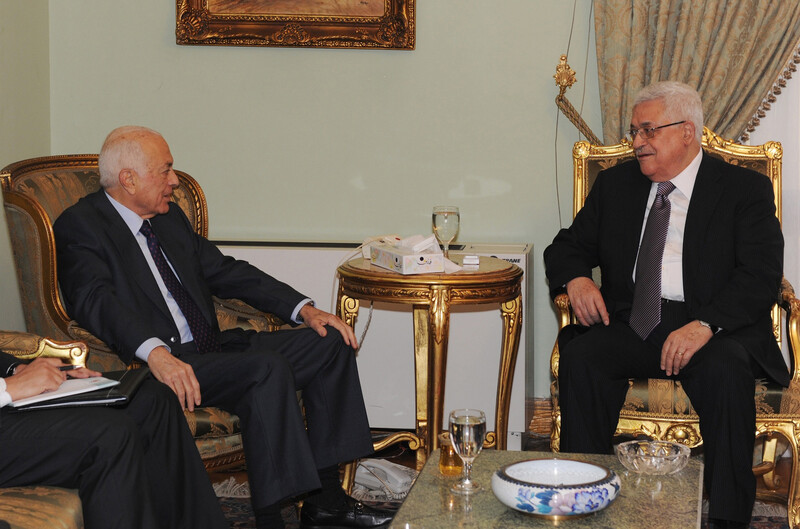The Electronic Intifada 5 May 2011

Palestinian President Mahmoud Abbas meets with Egyptian Foreign Minister Nabil al-Arabi in Cairo, 7 April 2011.
Maan ImagesCAIRO (IPS) - Rival Palestinian factions Hamas and Fatah signed a reconciliation agreement in Cairo on Wednesday, paving the way for the formation of a Palestinian national unity government. The move, say local analysts, reflects the changing political equation in the Middle East amid the ongoing wave of Arab popular uprisings.
“The revolutions currently sweeping the region — especially the fall of Egypt’s Mubarak regime — have altered the strategic balance, particularly as it pertains to the Arab-Israeli file,” Mohamed Megahid al-Zayat, assistant director of the Cairo-based National Center for Middle East Studies, told IPS.
On 27 April, Fatah and Hamas unexpectedly announced plans to sign an agreement aimed at forming a national unity government composed of independent technocrats. According to the deal, which followed weeks of secret talks in Cairo, the new unity government would remain in place until Palestinian legislative and presidential elections are held within one year.
A statement issued by Egypt’s general-intelligence apparatus, which brokered the agreement, noted that the talks had “resulted in full understandings on all points of discussion, including setting up an interim agreement with specific tasks and setting a date for elections.”
On Wednesday, the two factions, along with 11 other smaller Palestinian groups, officially endorsed the agreement in Cairo. A formal signing ceremony today was expected to be attended by Fatah headman and Palestinian Authority President Mahmoud Abbas and Hamas politburo chief Khaled Meshal.
Three joint committees have reportedly been drawn up to discuss means of integrating the two factions’ security forces, restructuring the Palestine Liberation Organization to accommodate Hamas and establishing a system and timetable for upcoming elections. The accord also reportedly calls for a prisoner exchange between the two sides.
Hamas and Fatah have pursued bitter rivalry since 2006, when Palestinian legislative elections were swept by Hamas. Mutual animosity between the two factions reached boiling point the following year, when Hamas seized control of the Gaza Strip from the Fatah-led PA.
Since then, Hamas has governed the Gaza Strip, while the PA has continued to operate out of the Israeli-occupied West Bank.
Unlike Hamas, the US-backed PA — known for maintaining close security and intelligence ties with Israel — is committed to pursuing a discredited “peace process.” The most recent round of PA-Israel talks broke down last September following the latter’s refusal to halt construction of Jewish-only settlements on occupied West Bank land.
Further complicating the situation, Israel and Egypt — with the PA’s blessing — have both kept their borders with the Hamas-run Gaza Strip tightly sealed for the last four years. The de facto siege has effectively cut the enclave off from the rest of the world, depriving its roughly 1.5 million inhabitants of desperately needed foodstuffs, fuel, medical supplies and building materials.
According to Egyptian analysts, the breakthrough in Cairo comes as a direct consequence of the 11 February ouster of longstanding Egyptian president Hosni Mubarak. Since then, the country’s affairs have been run by Egypt’s Supreme Council of the Armed Forces (SCAF), which has promised to hold democratic national elections later this year.
“Mubarak’s departure removed Fatah’s chief regional ally from the equation, prompting it to reconcile with Hamas,” said al-Zayat. “Hamas, meanwhile, signed on to the deal because it knows the SCAF government will be a far more even-handed mediator than the Mubarak regime ever was.”
Inter-Palestinian mediation efforts overseen by the previous regime had been widely seen as favoring Fatah. “Mediation efforts under Mubarak failed largely because they were biased against Hamas, in line with US and Israeli diktats,” Tarek Fahmi, political science professor at Cairo University, told IPS.
While the Mubarak regime had pressured Hamas to abandon armed resistance and recognize Israel as part of any proposed reconciliation agreement, Wednesday’s accord contained no such conditions.
Abbas asserted last week that the deal would not affect his stalled talks with Tel Aviv. Hamas, however, has reiterated its refusal to acknowledge Israel, while reserving the right to engage in armed resistance against the Israeli occupation.
Israel, for its part — which along with the US and EU calls Hamas a “terrorist organization” — was quick to register its opposition to the reconciliation agreement.
“The PA must choose either peace with Israel or peace with Hamas — there is no possibility for peace with both,” Israeli Prime Minister Benjamin Netanyahu said last week. On the same day, the US State Department declared that any future Palestinian government must promise to renounce violence, abide by past agreements and recognize Israel.
But Egypt’s post-revolutionary transitional government appears to be unperturbed by such proclamations.
“The new leadership in Cairo doesn’t give a damn about what Israel and its allies think about how Egypt relates to Hamas,” Ahmed Youssef, former political advisor to the Hamas-led Gaza government, was quoted as saying in Egypt’s state press.
Notably, on 28 April, Egypt’s SCAF-appointed foreign minister, Nabil al-Arabi, announced that Egypt would permanently reopen its border with the long-suffering Gaza Strip “within the next ten days.”
According to local commentators, the move represents a further indication of Egypt’s post-revolutionary policy realignment vis-a-vis Hamas.
“Since the revolution, Egypt’s position on the Palestine issue — and Hamas in particular — has reversed course,” Saad al-Husseini, a leading member of Egypt’s Muslim Brotherhood movement (which enjoys close ideological affiliations with Hamas), told IPS. “The FM’s promise to reopen the border shows that — unlike the Mubarak regime — Egypt’s transitional government doesn’t view Hamas as an enemy.
“With Mubarak and his circle out of the picture, Egyptian foreign policy is finally working in the interests of Egypt, the Palestinian cause and the Arab world,” al-Husseini added. “It’s returning to its natural state.”
All rights reserved, IPS - Inter Press Service (2011). Total or partial publication, retransmission or sale forbidden.


